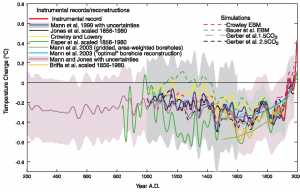
The Hockey Stick graph — a paleoclimate reconstruction of global temperatures for the last millennium courtesy of Mann et al
Fossil fuel funded groups have stymied efforts in the US to make any headway at all on carbon emissions. But a Paris based group, the International Energy Agency (IEA), says we can limit the damage to a relatively manageable rise of 2° C (3.6° F) by the end of this century, if we wake the fuck up:
Christian Science Monitor — The agency estimates that the aggressive global approach it recommends could slash that 2020 emissions excess to a far more manageable 900 million tons.
Some 49 percent of that reduction would come from tighter energy-efficiency standards on everything from cars and home appliances to industrial motors and heating and cooling equipment. Another 21 percent could come from reducing reliance on – or simply not building – coal-fired power plants that use the least-efficient technology. Some 18 percent of the emissions reductions would come from plugging methane leaks at oil and natural-gas refineries and in pipelines. Finally, 12 percent of the reductions could come from a partial reduction in subsidies to the fossil-fuel industry.
“We identify a set of proven measures that could stop the growth in global energy-related emissions by the end of this decade at no net economic cost,” said IEA Chief Economist Fatih Birol, the report’s lead author, in a statement. “Rapid and widespread adoption could act as a bridge to further action, buying precious time while international climate negotiations continue.”
A rise of 2° C by the year 2100 is a big, big jump in a very short time. That graph above is scored in 0.2° C intervals and stretches sideways across 10 centuries. To see a global average 2 degrees warmer wouldn’t be a hockey stick anymore, it would be more like a scythe, it would take us back way before the the Middle Ages, maybe to the Miocene, which lasted from about 22 to 5 MYA, or earlier. For one thing, it probably means no permanent ice-caps, only seasonal accumulations at the North and South Pole. How long it would take the Antarctic to lose several KMs of surface ice is an interesting question. It might take thousands and thousands of years. But that’s a big rise, it will mean adapting to a measurably different planet.

Thanks for the post, Stephen! In the wake of all the fallout from the NSA situation sure to be permeating the airwaves in the coming days, we need to remind ourselves that we should keep our eyes on the bigger issues.
In the process of waking the fuck up we must start a national dialogue about the 1600-pound bull elephant in the room, and that elephant’s name is economic growth. The mindset that the last 150 years of economic growth can continue on a finite planet is no longer tenable; the monumental task now before us is managing the inevitable transition to a terrestrial steady-state economy.
We’ve made a very big difference in a very short time – more and faster than predicted Arctic sea ice ~wise which has serious implications of its own :
http://www.youtube.com/watch?v=YgiMBxaL19M
1979 to 2012 a geological fifth of an eyeblink.
Geological context here :
http://www.youtube.com/watch?v=DiM1DSmCSUc
180 to 280 ppm as natural Co2 range – now we’re at 400 ppm and climbing fast., Glaciologist Richard Alley and the climate roller-coaster.
More geological context here :
http://www.youtube.com/watch?v=vA7tfz3k_9A
as well : “Pumphandle 2012: Time history of atmospheric carbon dioxide” with 800,000 years of Earth;s history.
They’ve done the maths, made the observations and calculations and the results flippin’ scary. If you have any appreciation of the physics and facts involved.
Human technology and ingenuity and will and hope is going to be severely tested in our lifetimes I fear.
I don’t think its too late to do something – the more and the sooner the better – that will slow and reduce the impacts of Human-Induced Rapid Global Overheating (HIRGO) as I prefer to call it.
Some – quite a lot actually – of damage and human suffering is now probably unavoidable because of thermal inertia, climate feedbacks that are already happening and the elevated levels of Greenhouse gases (GHGs) in our atmosphere already.
However, as I think I’ve noted before, its like being in an out of control car about to hit a wall at high speed. Impact may be inevitable, damage may be inevitable but if you brake and get some speed scrubbed off you’re going to hit less hard and do less damage than if you do absolutely nothing and plough into that wall at the higher velocity. Could be the difference between being wiped out, the car written off and us killed and just a few broken bones and something the crash repairers can fix up again for us.
The Deniers here are doing the equivalent of saying do nothing or worse yet hit the accelerator and slam into that wall harder. Which makes them stupid, murdering, self-destructive idiots.
A good analogy, StevoR!
IMO, our biggest hurdle to overcome in slowing the car down is this.